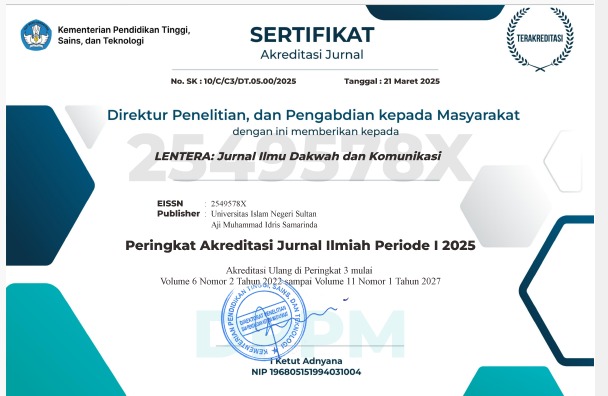Religious Tolerance Drives The Progress of Muhammadiyah Da'wah
Abstract
Muhammadiyah proactively seeks to involve all segments of society in various educational and social activities. This approach not only strengthens the basis of tolerance and understanding between religious communities but also helps reduce prejudice and promote peaceful coexistence. Education is one of the most effective tools used by Muhammadiyah to spread the values of tolerance. Schools and universities founded by this organization offer curricula that emphasize the importance of social harmony and diversity. This education is not limited to academic knowledge alone, but also involves extracurricular activities that promote interaction between students from various religious and ethnic backgrounds. The success of this approach can be seen not only from the harmony maintained between religious communities within Muhammadiyah but also from the recognition and appreciation received from the wider community. This proves that religion can be a positive force in a pluralistic society, supporting the idea that tolerance and harmony are the main pillars in building and maintaining a society.
References
Agustyawati, L. (2022). Strategi Dakwah Kultural Muhammadiyah Di Era Digital. Tajdida: Jurnal Pemikiran Dan Gerakan Muhammadiyah, 20(1), 31–37.
Alwi, M. (2013). Gerakan Dakwah Muhammadiyah di Sulawesi Selatan. Jurnal Diskursus Islam, 1(1), 74–84. journal.uin-alauddin.ac.id/index.php/diskursus_islam/article/view/6583
Danik Prahastiwi, E., Tias Aorta, D., & Wahyuningsih, D. (2021). Bergesernya Pola Interaksi Sosial Keagamaan Islam Selama Pandemi Covid-19. Jurnal Pemikiran Keislaman Dan Kemanusiaan, 5(2), 109.
Depdikbud. (1993). Kamus Besar Bahasa Indonesia. Balai Pustaka.
Dewi, D. K., & Triandika, L. S. (2020). Konstruksi Toleransi pada Akun Media Sosial Jaringan Gusdurian. Lentera, 4(1), 19–39. https://doi.org/10.21093/lentera.v4i1.2159
Fitriyanto, M. N., & Putra, C. A. (2021). Persyarikatan Muhammadiyah Merespon Perkembangan Teknologi Informasi Dan Revolusi Industri 4.0. Anterior Jurnal, 20(2), 50–55. https://doi.org/10.33084/anterior.v20i2.1654
Huda, M. T., & Dina, U. (2009). TAFSIR AL- SYA ’ RAWI. 44–60.
Kossah, A. U., Benyal, H. S., & Romelah, R. (2022). Islam Berkemajuan: Muhammadiyah Sebagai Pembaharu Pendidikan Dalam Laju Zaman. TARLIM : JURNAL PENDIDIKAN AGAMA ISLAM, 5(1). https://doi.org/10.32528/tarlim.v5i1.7149
Latif, M. A. (2021). Pengembangan Metode Pendidikan Agama Islam Berbasis Kisah Qurani Sebagai Media Penanaman Karakter Islami. Idarah Tarbawiyah: Journal of Management in Islamic Education, 2(1), 21. https://doi.org/10.32832/itjmie.v2i1.3659
Mandasari, Y., Ahmad, A., Yulianti, N., & ... (2021). Penguatan Pendidikan Karakter Profetik melalui Optimalisasi Peran Taman Pendidikan Al-Quran di Sumberjatipohon, Grobogan. Buletin KKN Pendidikan, 3(1), 100–106. https://doi.org/10.23917/bkkndik.v3i1.14549
Muhammadiyah, M. T. dan T. P. P. (2018). Himpunan Putusan Tarjih. Grha Suara Muhammadiyah.
Mulkhan, A. M. (2010). Marchaenis Muhammadiyah. Galang Press.
Nashir, H. (2015). Understanding the ideology of Muhammadiyah.
Nirwana, A. (2013). Wawasan Al-Qur’an Tentang Toleransi. Tafsere, 1(1), 35.
Sutama. (2019). Metode Penelitian Pendidikan ( Kuantitatif, Kualitatif PTK, Mix Method, R&D). CV. Jasmine.
Tim Fkub Semarang. (2009). Kapita Selekta Kerukunan Umat Beragama. FKUB.
Yusufhadi. (1994). Definisi Teknologi Pendidikan. Grafindo Persada.
Zakiah Daradjat. (1996). Perbandingan Agama. Bumi aksara.
Copyright (c) 2024 Lentera: Jurnal Ilmu Dakwah dan Komunikasi

This work is licensed under a Creative Commons Attribution-ShareAlike 4.0 International License.
Penulis yang menerbitkan artikel di Lentera: Jurnal Ilmu Dakwah dan Komunikasi setuju dengan ketentuan berikut:
- Penulis memiliki hak cipta artikel dan memberikan hak jurnal untuk publikasi pertama dengan karya yang secara simultan dilisensikan di bawah CC-BY-SA atau The Creative Commons Attribution – ShareAlike Licence.
- Penulis dapat membuat perjanjian kontrak tambahan yang terpisah untuk distribusi non-eksklusif versi jurnal yang diterbitkan dari karya tersebut (misalnya, mempostingnya ke repositori institusional atau menerbitkannya dalam sebuah buku), dengan pengakuan atas publikasi awalnya di jurnal ini.
- Penulis diizinkan dan didorong untuk memposting pekerjaan mereka secara online (misalnya, dalam repositori institusional atau di situs web mereka) sebelum dan selama proses pengajuan, karena dapat menyebabkan pertukaran yang produktif, serta kutipan yang lebih awal dan lebih besar dari karya yang diterbitkan (Lihat The Effect of Open Access)
Authors who publish articles in Lentera: Jurnal Ilmu Dakwah dan Komunikasi agree to the following terms:
- Authors retain copyright of the article and grant the journal right of first publication with the work simultaneously licensed under a CC-BY-SA or The Creative Commons Attribution–ShareAlike License.
- Authors are able to enter into separate, additional contractual arrangements for the non-exclusive distribution of the journal's published version of the work (e.g., post it to an institutional repository or publish it in a book), with an acknowledgment of its initial publication in this journal.
- Authors are permitted and encouraged to post their work online (e.g., in institutional repositories or on their website) prior to and during the submission process, as it can lead to productive exchanges, as well as earlier and greater citation of published work (See The Effect of Open Access).












.png)
